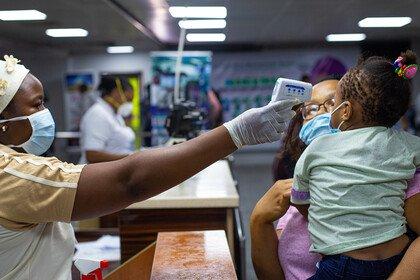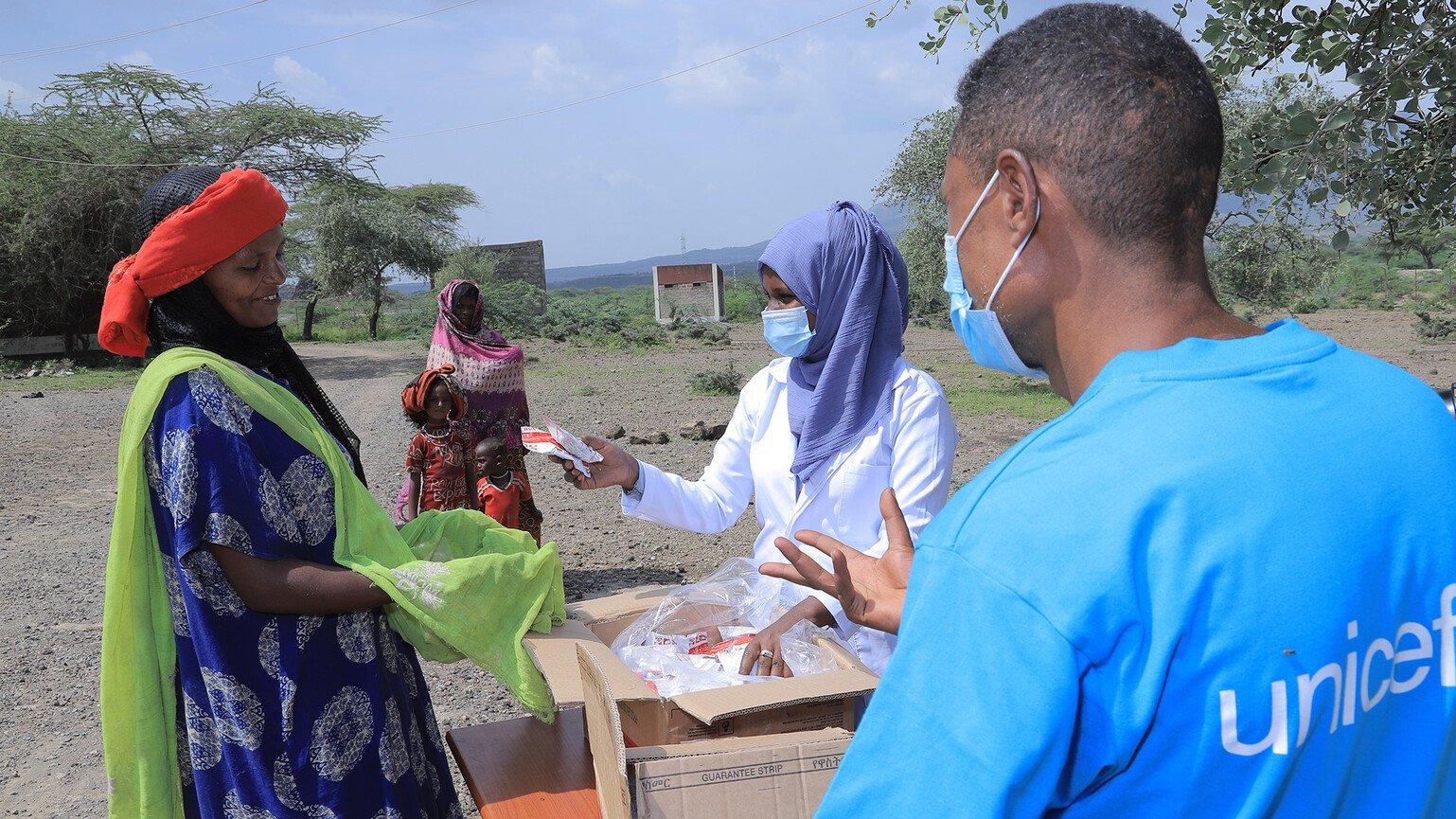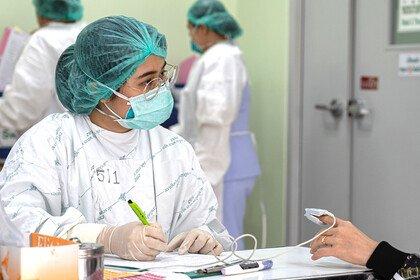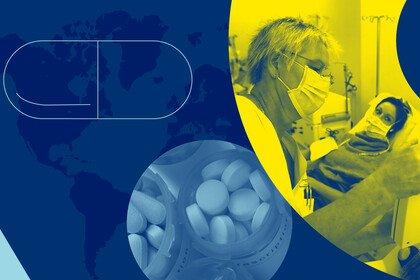
A look inside the global partnership that's working to find and deliver Covid-19 treatments
Finding and delivering Covid-19 treatments worldwide requires global collaboration at an unprecedented scale. Paul Schreier describes how the ACT-Accelerator Therapeutics Partnership works and what it needs to achieve its mission.

Health extension workers distributing Ready-to-Use Therapeutic Food in Ethiopian communities affected by climate change and the indirect effects of Covid-19. UNICEF is one of the organisations that will deliver Covid-19 treatments to the most marginalised communities worldwide.
UNICEF Ethiopia/2020/ Ephrem Tamiru
When I joined Wellcome last September, I could not have predicted that in a year I would be one of the convenors for an extraordinary global partnership to find and deliver millions of lifesavings treatments during a pandemic.
Much about this year has been unprecedented. I had only been at Wellcome for six months when the Covid-19 crisis hit. We had to rapidly shift our operations to facilitate remote working and ensure the safety of our staff. Our people were absolutely outstanding in adapting to this new world so quickly. At the same time, we had to quickly shift to support the global push to find Covid-19 treatments, tests and vaccines.
For me, this started in February, when I got involved in the creation of the COVID-19 Therapeutics Accelerator which Wellcome co-founded with the Bill & Melinda Gates Foundation and Mastercard. We established this initiative to coordinate research and development (R&D) efforts, help remove barriers to drug development and scale up treatments to prevent or treat mild and moderate coronavirus cases.
Soon after, I took on the role as co-convenor for the therapeutics workstream of the most comprehensive global initiative to stop the pandemic – the Access to COVID-19 Tools (ACT) Accelerator. In just a few months, the ACT-Accelerator Therapeutics Partnership has made outstanding progress, and to me, proven why we need a multilateral approach to change the course of this pandemic.
Here, I wanted to share some insights about how we make a global collaboration of this scale work in practice.
What is the ACT-Accelerator Therapeutics Partnership?
The ACT-Accelerator is a groundbreaking global collaboration to accelerate development, production, and equitable access to Covid-19 tests, treatments and vaccines, and strengthen health systems.
It was launched by the World Health Organization (WHO) in April, and brings together governments, scientists, businesses, civil society, philanthropists and international health organisations. The Therapeutics Partnership is the pillar dedicated to treatments, led by Wellcome and Unitaid.
Who is involved?
I work alongside my counterpart, Philippe Duneton, Executive Director of Unitaid, to oversee workstreams dedicated to treatment research, market entry, and delivery of treatments in low- and middle-income countries.
Other organisations have partnered with us, offering specific insight and expertise in each workstream. R&D is overseen by Wellcome, the Bill & Melinda Gates Foundation and the WHO, via the COVID-19 Therapeutics Accelerator.
Manufacturing, procurement and delivery have been overseen by Unitaid and the Global Fund, with additional support from UNICEF, the WHO and the Bill & Melinda Gates Foundation.
What does the Therapeutics Partnership want to do?
We want to find the most promising treatments for everyone across the world and make sure that the most marginalised communities can access them too.
To achieve this, we need $7.2 billion to fund treatment research, prepare the market to produce treatments at scale, and deliver 245 million treatment courses in low- and middle-income countries by mid-2021.
What has the Therapeutics Partnership achieved so far?
It is remarkable how much progress we’ve made under exceptionally challenging circumstances, working remotely with colleagues with very different expertise, in different time zones, in different organisations. Many of us had never met before developing this partnership, but we managed to establish close working relationships within weeks.
When we started, one of our first tasks was to analyse ongoing clinical trials to find which treatments looked most promising and could be manufactured in high volume rapidly. We have since analysed over 1,700 clinical trials and, based on this data, we have high hopes that monoclonal antibodies and new antivirals will be instrumental in treating people with Covid-19.
We have also moved quickly to secure proven treatments for low- and middle-income countries. Less than 20 days after dexamethasone was found to be an effective treatment for hospitalised patients, we secured 2.9 million treatment courses for low- and middle-income countries. Here, the work of partners from the WHO, Unitaid, the Global Fund and UNICEF was critical, and the speed with which they moved to access and procure treatments was outstanding.
What is making it harder to achieve our goals?
To deliver our mission and provide treatments around the world we need $7.2 billion. So far, governments, philanthropies and private donors have committed $300 million.
While this is a considerable investment, it is significantly less than we need. This lack of funding could slow the rapid pace of research – that means not finding treatments as quickly as we could. It could also weaken our efforts to make treatments available for all those who need them.
For example, manufacturing capacity for monoclonal antibodies is scarce and competition is fierce. The Bill & Melinda Gates Foundation, as part of the COVID-19 Therapeutics Accelerator, has already reserved manufacturing capacity and is working with Eli Lilly to trial and deliver monoclonal antibody treatments for low- and middle-income countries.
To meet global demand for treatments, we need many more agreements like this. But without urgent funding, we risk missing important opportunities to secure global availability of treatments.
Why is the ACT-Accelerator so important?
One research team, one company, or even one country cannot solve this crisis alone. Global collaboration and multilateralism are crucial.
Previous epidemics have shown what can be achieved by global collective action through partnerships like Unitaid and The Global Fund to fight AIDS, Tuberculosis and Malaria. Through these, governments, NGOs, and public and private sector organisations have come together to finance and ensure access to healthcare innovations, including treatments. Since 2002, the number of deaths caused by AIDS, TB and malaria has dropped by 40% in the countries where the Global Fund invests – showing the massive impact that collective action can make.
We need to continue to build on these partnerships through global collaboration, which is why the ACT-Accelerator is so important.


